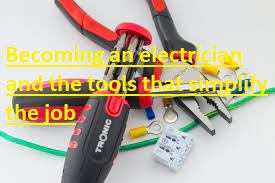Hello readers welcome to the new post. Here we will learn the Becoming an electrician and the tools that simplify the job. Electricians are highly skilled workers that we’ve come to rely on. They require specific training to provide safe, useable electricals on a property. They’ll install electrics in a new build, and they’re there if things go wrong. Perhaps the shower has started to spark, or the lighting is flickering? People will automatically search for a professional who can come out to assess the issue as soon as possible.
The demand for electrician jobs
While we’ve always depended on electricians, right now in the UK they are particularly in demand. This is because there aren’t enough electricians available. According to the latest UK Trade Skills Index 2023, there is an ‘alarming’ skills gap across the construction sector, and over 100,000 new electrician recruits are needed by 2032. Skills shortages of electricians rose rapidly in 2021, alongside plumbers, bricklayers, and carpenters.
The reason for this gap in skilled, qualified electricians – and other tradespeople – is that we have an ageing workforce combined with the loss of EU workers who moved away after Brexit. Add to that an expanded output across the sector and it’s clear that there aren’t enough electricians to go around and a huge need for more.
In the three months to October 2022, the Trade Skills Index reveals, vacancies per 100 jobs across the construction sector reached 3.4 – a record high.
Why become an electrician?
There are plenty of reasons why you might consider becoming an electrician. Some of the most popular include:
- Job security – people will always need electricians. From homeowners to property developers, electricals are a key addition to any building. Plus, with there being such a high demand for skilled electricians, you’re likely to be joining a profession that values your capabilities.
- Pay – electricians have a high earning potential. Once trained and fully skilled after apprenticeship, salaries can quickly rise.
- Varied workday – no two electrical jobs are the same. You get to use your expertise to problem solve, work out issues or set up the electrics in a new building. Plus, you get to meet a range of different people from all walks of life.
What tools are needed?
there are some key tools that electrition need to get the job done. The basics include pliers, a tape measure, an electric drill, electrical tape, and a level to line up sockets correctly. Electric management software is also a great tool for keeping track of customer details and invoices.
The more advanced ones include:
- Heavy-duty cable cutters – these are specifically designed to withstand electrical volts.
- Diamond core drill bits – essential for precision drilling into walls where electrics are being fitted.
- Splicing connector – connect pieces of wire easily with this tool, specifically designed for electrical cables and wiring.
- Reaming bit – used to enlarge holes.
Take the time to weigh up the equipment you need. As you continue to build your skills, you’ll add to your electrician’s toolkit.







